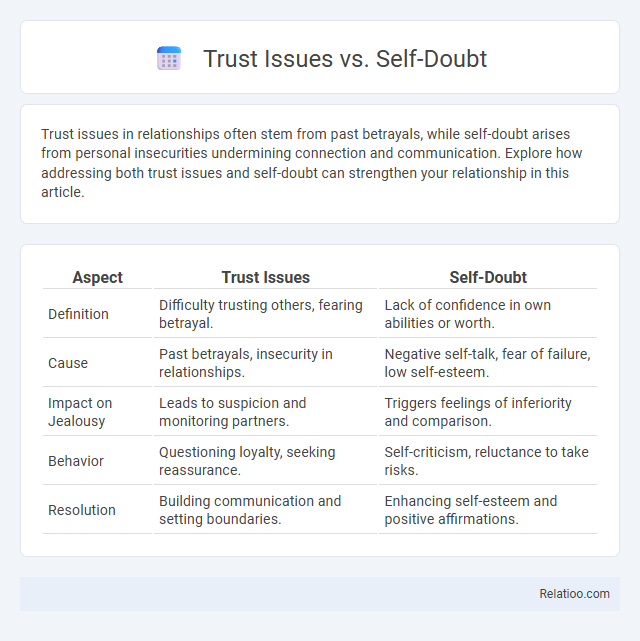Trust issues in relationships often stem from past betrayals, while self-doubt arises from personal insecurities undermining connection and communication. Explore how addressing both trust issues and self-doubt can strengthen your relationship in this article.
Table of Comparison
| Aspect | Trust Issues | Self-Doubt |
|---|---|---|
| Definition | Difficulty trusting others, fearing betrayal. | Lack of confidence in own abilities or worth. |
| Cause | Past betrayals, insecurity in relationships. | Negative self-talk, fear of failure, low self-esteem. |
| Impact on Jealousy | Leads to suspicion and monitoring partners. | Triggers feelings of inferiority and comparison. |
| Behavior | Questioning loyalty, seeking reassurance. | Self-criticism, reluctance to take risks. |
| Resolution | Building communication and setting boundaries. | Enhancing self-esteem and positive affirmations. |
Understanding Trust Issues and Self-Doubt
Trust issues often stem from past betrayals or negative experiences, leading to difficulty relying on others, while self-doubt centers on an individual's lack of confidence in their own abilities or worth. Understanding trust issues involves recognizing patterns of suspicion and emotional barriers, whereas addressing self-doubt requires building self-esteem and challenging internal negative beliefs. Both trust issues and self-doubt impact personal relationships and mental health, making awareness and targeted strategies crucial for emotional well-being.
Root Causes of Trust Issues
Trust issues often stem from past betrayals, childhood trauma, or inconsistent relationships that erode Your ability to rely on others. Unlike self-doubt, which primarily arises from internal fears and insecurities about personal abilities, trust issues focus on external experiences that challenge Your belief in others' reliability. Understanding the root causes of trust issues is essential for healing and developing healthier interpersonal connections.
Common Triggers of Self-Doubt
Common triggers of self-doubt include negative past experiences, fear of failure, and lack of positive reinforcement, which often intertwine with trust issues as both affect confidence in oneself and others. Self-doubt can stem from internal criticism and unrealistic expectations, while trust issues usually arise from betrayal or inconsistent behavior by others. Recognizing these triggers helps distinguish self-doubt as an internal struggle linked to personal insecurities, whereas trust issues primarily involve external relational dynamics.
The Psychological Impact of Trust Issues
Trust issues cause significant psychological distress by fostering anxiety, insecurity, and difficulties in forming meaningful relationships, which can exacerbate feelings of loneliness and emotional isolation. Self-doubt undermines confidence and decision-making, but trust issues specifically create barriers to vulnerability and openness with others, intensifying emotional distress. Addressing your trust issues is crucial for improving mental well-being and building healthier interpersonal connections.
How Self-Doubt Shapes Your Decisions
Self-doubt significantly shapes your decisions by undermining your confidence and causing hesitation in choosing options, which leads to missed opportunities and increased anxiety. Unlike trust issues, which involve doubts about others' intentions, self-doubt centers on questioning your own abilities and judgment, often resulting in a cycle of second-guessing and overthinking. Addressing self-doubt involves building self-awareness and reinforcing positive self-talk to strengthen decision-making skills and personal resilience.
Trust Issues vs Self-Doubt: Key Differences
Trust issues primarily stem from difficulties in believing others' intentions or reliability, often rooted in past betrayals or trauma, whereas self-doubt originates internally as uncertainty about one's own abilities or worth. Trust issues affect interpersonal relationships and can hinder collaboration, while self-doubt impacts personal confidence and decision-making processes. Understanding these distinctions helps target therapeutic approaches, as trust issues require rebuilding interpersonal trust, while self-doubt involves fostering self-esteem and cognitive restructuring.
The Interplay Between Trust Issues and Self-Doubt
Trust issues often stem from past betrayals and can significantly amplify self-doubt, causing you to question your worth and judgment in relationships and decision-making. Self-doubt feeds into trust issues by undermining confidence in others' intentions and your ability to assess situations accurately. Understanding this dynamic helps in breaking the cycle, fostering healthier interactions, and building personal resilience.
Identifying Signs of Trust Issues and Self-Doubt
Identifying signs of trust issues include constant suspicion, difficulty relying on others, and feeling guarded in relationships. Self-doubt manifests through negative self-talk, hesitation in decision-making, and diminished confidence in your abilities. Recognizing these patterns allows you to address underlying emotional barriers and improve personal growth.
Strategies to Overcome Trust Issues
Trust issues often stem from past betrayals or inconsistencies in relationships, leading to difficulty relying on others, while self-doubt centers on questioning your own abilities and worth. Strategies to overcome trust issues include fostering open communication, setting clear boundaries, and gradually building trust through consistent, honest interactions. By addressing these challenges, you can improve your relationships while boosting your confidence and emotional well-being.
Building Confidence and Self-Belief
Trust issues often stem from past betrayals or inconsistent relationships, making it difficult to rely on others, while self-doubt primarily involves internal uncertainties about one's abilities and worth. Building confidence and self-belief requires consistent positive self-affirmations, setting achievable goals, and celebrating small successes to reinforce a reliable self-image. Cultivating emotional resilience and seeking supportive environments can transform both trust issues and self-doubt into opportunities for personal growth and empowerment.

Infographic: Trust issues vs Self-doubt
 relatioo.com
relatioo.com